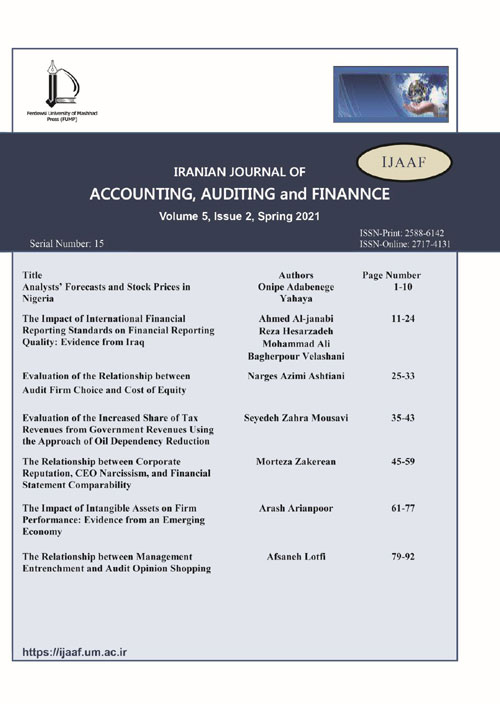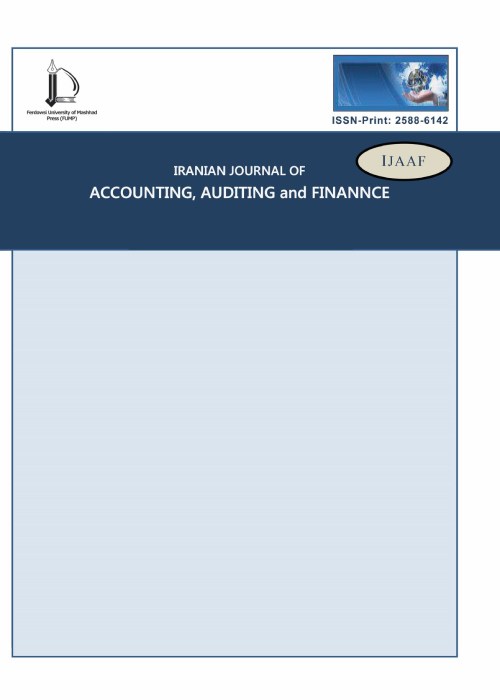فهرست مطالب

Iranian Journal of Accounting, Auditing and Finance
Volume:2 Issue: 4, Autumn 2018
- تاریخ انتشار: 1399/09/19
- تعداد عناوین: 7
-
Pages 1-10
The present study's main objective is to assess the impact of political uncertainty on cost stickiness intensity. This paper attempts to compare the cost stickiness intensity in periods with high political uncertainty with other periods. The statistical population includes listed companies on the Tehran Stock Exchange during 2009-2016 that given the use of screening methods, and after omitting the remote observations, this amount reaches 131 firms. In this paper, political uncertainty and sales changes were considered independent variables to assess their impact on asymmetrical cost behavior. In this paper, the panel data approach is used to test the research hypothesis. The data analysis results of firms using the multivariate regression at the 95% confidence level demonstrate that political uncertainty has a significant effect on cost stickiness intensity. The presidential election years of 2009 and 2013 were considered as years with high political uncertainty to achieve the objectives. The study results indicate the presence of sticky behavior of sales, general, and administrative costs in the so-called years. The asymmetry in cost behaviors is stronger during election years than in the non-election years, even after controlling other firm-level and country-level determinants.
Keywords: cost stickiness, political uncertainty, presidential election -
Pages 11-27
Fraud in financial accounting has grown significantly in recent years. With the financial crisis emergence in recent years, fraud in financial reporting has been entered in politics. Today, legislator assemblies, accounting, and management profession have paid special attention to financial reporting due to fraud and existing ways to prevent fraudulent behavior. Therefore, in this research, we investigate the relationship between the weakness of internal controls and fraudulent financial reporting with an emphasis on the adjustment role of external audit quality. This research was conducted during 2012- 2017 years for active companies operating in Tehran stock Exchange by selecting 114 companies as a statistical sample and using logistic regression tests in EViews statistical software. The results showed that, contrary to society's perception, there is no statistically significant relationship between the weakness of internal controls and fraudulent financial reporting. The results also showed that external audit quality did not have a statistically significant effect on the relationship between the weakness of internal control and fraudulent financial reporting.
Keywords: Fraudulent Financial reporting, weakness of internal controls, external auditquality -
Pages 29-39
Some conceptual studies believe that the nature of financial reporting quality (FRQ) is inherently context-specific, i.e., FRQ is defined only in the context of a specific decision made by a specific decision-maker, and it alone is meaningless. This article discusses how conditioning the FRQ on a specific context is not based on a well-built concept and may lead to problematic and misleading conclusions.
Keywords: financial reporting quality, context-specific nature, comment -
Pages 41-52
The proper and rapid current of the resources and their expenditure in any dynamic economy, especially the banks, presents the ideal use of administrative methods. Therefore, collecting debts in a certain period shows the proper benefits of resources to create the required facilities for developing economic activities and supplying resources needed for different production, commercial, services, and bank sections. Banks with less non-performing assets. Invest their released resources in new businesses or accept more commitment for payment, which increases the bank's capacity to make plans for consuming the resources, accept commitments, and make income. On the other side, an increase in non-flow assets may cause severe bank management problems not only because of a reduction in assets quality but also because the reduction in bank interests may lead to dangerous interbank problems and difficulties for supplying the investment. As a result, recognizing the effective factors on creating non-performing assets and making the right decision to prevent such assets' rise could decrease the banks' risk in granting loans and increase profitability. According to Garret Ranking Technique, the present study discusses the genesis of nonperforming assets in private and national banks and classifies them.
Keywords: non-flow assets, Garret Ranking, the national bank, Private Banks -
Pages 53-64
The present study aims to investigate the relationship between earnings management and a bonus of CEOs. Because earnings management does not have only opportunistic effects, but signaling effects, this study focuses on information disclosure quality to examine earnings management incentives. If firms are classified into two groups of firms with predictive and opportunistic earnings management, it can be assumed that incentives and managers’ operation in these two groups differ. The research's target population consists of listed companies on the Tehran Stock Exchange, among which 91 companies selected over a period from 2009 to 2016. The panel data technique has been applied to estimate the research model. The study's findings show that CEO’s reward has an insignificant positive relationship with predictive earnings management and an insignificant negative relationship with opportunistic earnings management. It shows that firms are bereft of appropriate plans for the CEO’s rewards. Furthermore, the relationship between predictive earnings management, opportunistic earnings management, and the stock return has been investigated. The achieved findings indicate that stock return is influenced by disclosure quality. In other words, the stock return has a positive relationship with predictive earnings management and a negative relationship with opportunistic earnings management.
Keywords: predictive earnings management, opportunistic earnings management, accruals quality, disclosure quality, rewards paid to the board of directors, stock return -
Pages 69-78
The outbreak of COVID-19 in China and the speed at which it is spreading across the globe in 2019 to 2020 has had devastating consequences on tertiary institutions of learning. The majority of the tertiary institutions of learning have to shift learning from the usual classroom or face-to-face lectures to virtual or online lectures in addressing the challenges broad by the pandemic COVID-19. This paper aims to look at risk management of COVID-19 in tertiary institutions of learning and the responses to the emerging risks, challenges, and prospects in the future. The study also discussed the risk and challenges of COVID-19, reassessing tertiary institutions of the learning risk landscape, managing the risk, effective use of technology, the impact of COVID-19, responses, and future preparation for post-COVID-19. The ability of tertiary institutions of learning and the government to manage the risks of COVID-19 now and in the future is useful for various parties, including students, parents, lecturers, support staff, management team, investors, governments, and other stakeholders.
Keywords: Covid-19, risk management, tertiary institutions of learning, virtuallearning, classroom learning -
Pages 79-95
This study predicts future cash flows using a regression model and a particle swarm optimization algorithm (PSO). The variables of accruals components and operating cash flows were used, and the data of 137 listed companies on the Tehran Stock Exchange during 2009-2017 were studied. Eviews9 software for the regression model and Matlab13 software for the Particle swarm optimization algorithm was used to test the hypotheses. The results indicate that the regression model's variables and the Particle swarm optimization Algorithm in this study can predict future cash flows. Furthermore, the results of the fitting Particle swarm optimization Algorithm show that a structure with eight hidden neurons is the best model for predicting future cash flows, and the proposed neural network model compared with the regression model has higher prediction accuracy in predicting future cash flows. This study shows that the classification of assets and liabilities provides useful information from future operating cash flows.
Keywords: Accruals, Future Cash Flows, Artificial Neural Network, and Particleswarm optimization Algorithm


